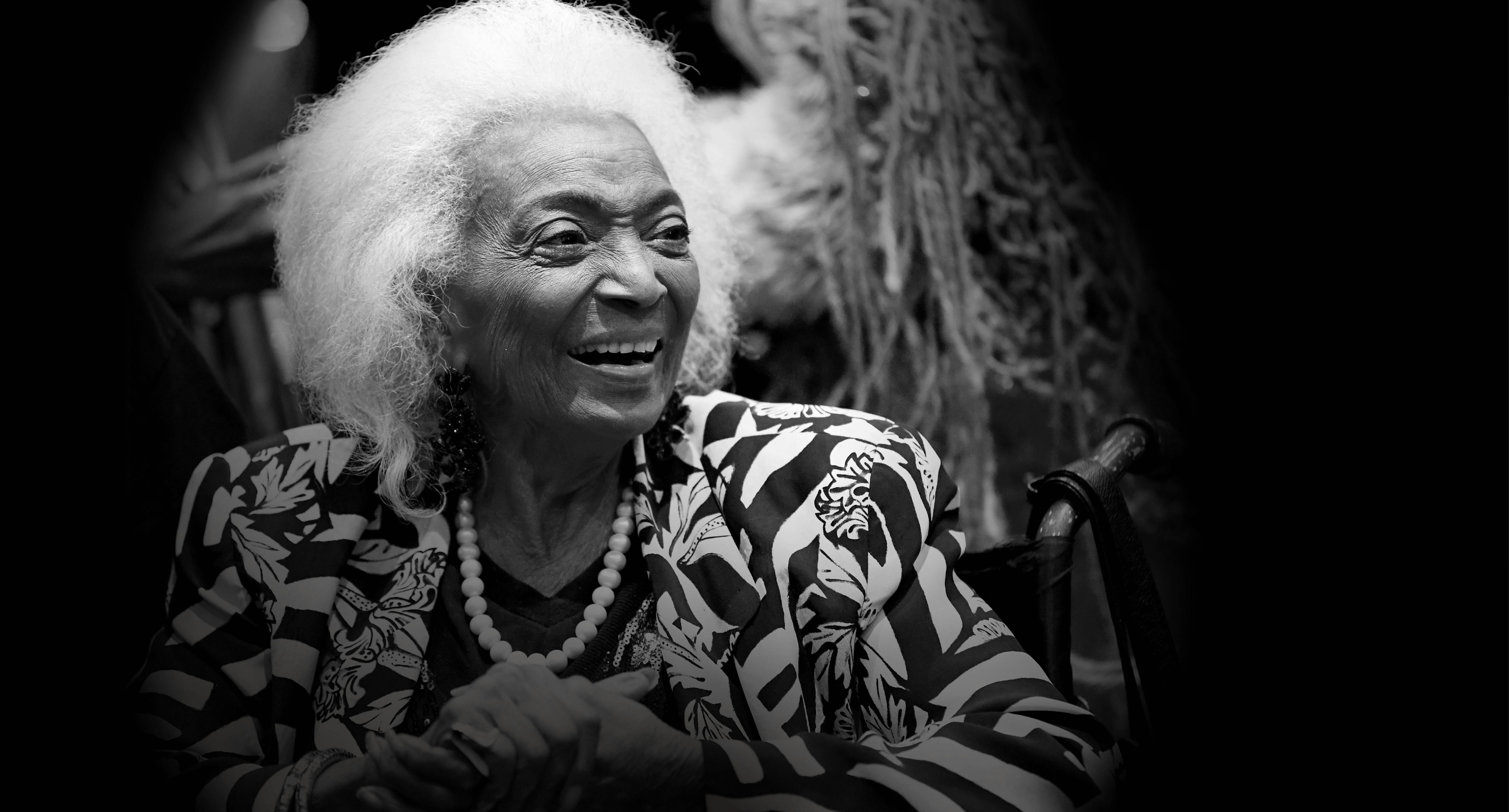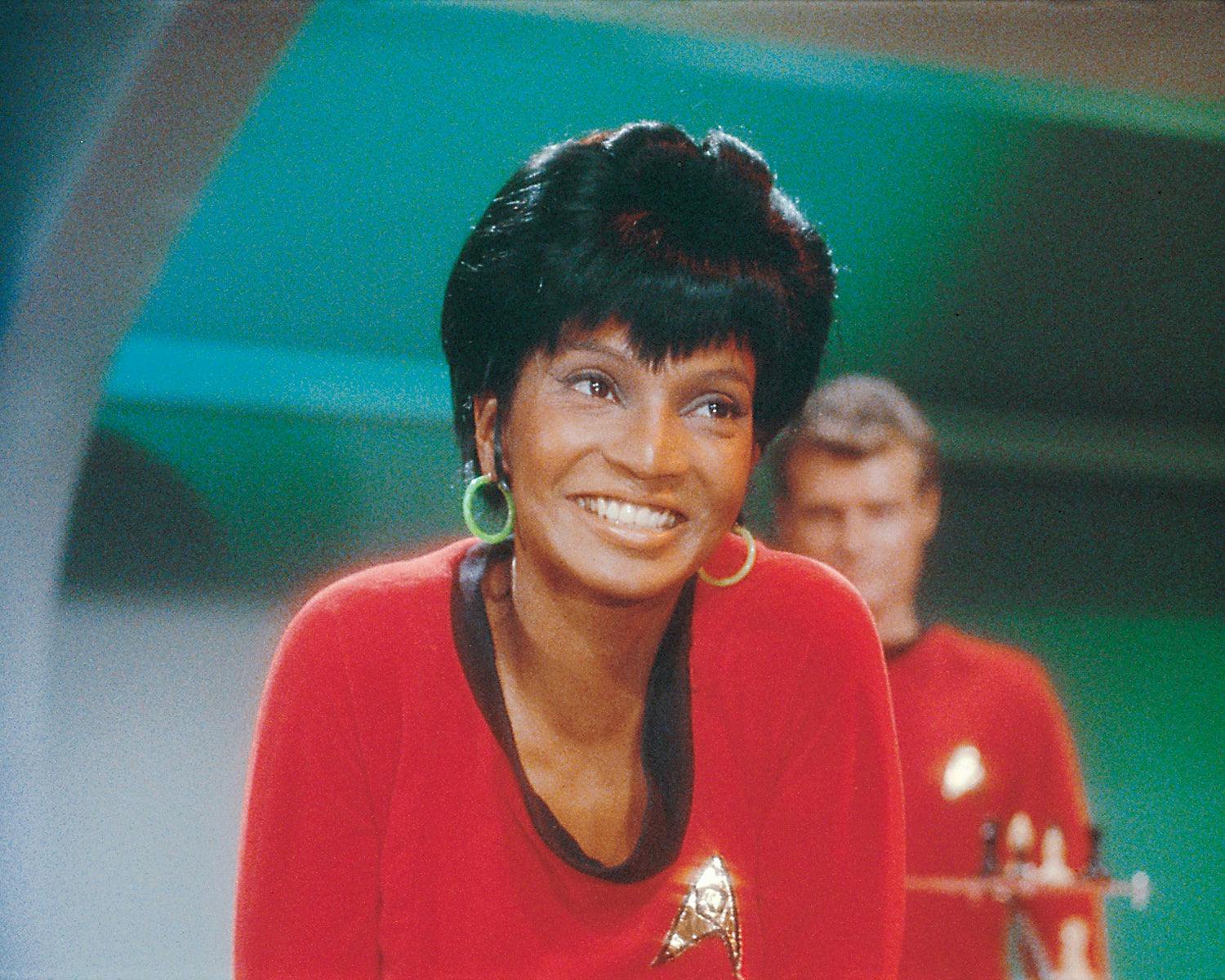Published Jul 31, 2022
Remembering Nichelle Nichols, 1932-2022
StarTrek.com honors the late, pioneering actress and her legacy.

StarTrek.com | Getty Images
StarTrek.com is deeply saddened to report the passing of Nichelle Nichols, the Star Trek franchise's beloved Lt. Uhura, who passed away on July 30, 2022. The radiant, ebullient actress embraced Star Trek, her role and the fans; spending parts of five decades as a favorite guest at Star Trek and science fiction conventions all around the world.
Nichols was born on December 28, 1932, in Robbins, Illinois, south of Chicago, to her father Samuel, the town mayor and chief magistrate, and her mother Lishia. She was 15 when she launched her career, touring with Duke Ellington as a dancer and singer, studying in Chicago as well as New York and Los Angeles. She also played the title role in a Chicago stock company production of Carmen Jones. Her earliest film credits included roles in Porgy and Bess, Mr. Buddwing, Doctor, You've Got to Be Kidding!, and Made in Paris.
In 1964, Nichols guest starred on the television show The Lieutenant, in an episode titled "To Set It Right," from writer-producer Gene Roddenberry. Having made an impression on Roddenberry, he hired Nichols to co-star on his next series, Star Trek, as Lt. Uhura, the Starfleet communications officer stationed aboard the U.S.S. Enterprise.
At the end of Season One, Nichols planned to quit the show, but the combination of a conversation with Roddenberry and a chance meeting with Dr. Martin Luther King, Jr. changed her mind. "When I told Gene [Roddenberry], I walked away, and as far as I was concerned, it was a fait accompli," she recalled. "Remember, I grew up in musical theater. I belonged to the theater, not to television or movies. Those were things I did when I hadn't quite made it where I wanted to go, but was on my way. I had quite a lot going for me. I had no idea of the power of being on a screen and people seeing you weekly. But I was ready to go.
"As nice as this little part was, and I loved the people and I loved working on it, and I was getting experience in a new medium, I didn't think twice about [leaving]," continued Nichols. "Gene said, 'You can't, Nichelle. Don't you see what I'm trying to do here?' I just looked at him, because I was resolute. He said, 'OK,' and I handed him my resignation. He took it and looked at it with sad eyes. He was behind his desk and I was standing in front of him and — I'll never forget it — he said, 'I'm not going to accept this yet.' He put it in his desk drawer and said, 'Take the weekend and think about this, Nichelle. If you still want to do this on Monday morning, I will let you go with my blessings.' I said, 'Thank you, Gene.' And I thought, Whew, that was rough, but I got through it."
"That weekend, I went to what I remember as a NAACP fundraiser, though it could have been something else," remarked Nichols. "Whatever it was, I was in Beverly Hills. I was being seated at the dais as other notables were coming to join us. One of the organizers came over to me and said, 'Ms. Nichols, I hate to bother you just as you're sitting down to dinner, but there's someone here who wants very much to meet you. And he said to tell you that he is your biggest fan.' I said, "Oh, certainly.' I stood up and turned around and who comes walking over towards me from about 10 or 15 feet, smiling that rare smile of his, is Dr. Martin Luther King. I remember saying to myself, 'Whoever that fan is, whoever that Trekkie is, it'll have to wait because I have to meet Dr. Martin Luther King.' And he walks up to me and says, 'Yes, Ms. Nichols, I am your greatest fan.' You know I can talk, but all my mouth could do was open and close, open and close; I was so stunned."
Dr. King told Nichols that Star Trek was the only show that he and his wife Coretta allowed their little children to stay up and watch. He described to her what the show and her role meant to him, how important it was for people of color to see Uhura, this character with dignity and knowledge. Finally, Nichols interrupted him, stating, "Thank you so much, Dr. King. I'm really going to miss my co-stars." Dr. King looked at her, the smile vanishing from his face, and he said, "What are you talking about?"
"I told him," Nichols recalled. "He said, 'You cannot,' and so help me, this man practically repeated verbatim what Gene said. He said, 'Don't you see what this man is doing, who has written this? This is the future. He has established us as we should be seen. Three hundred years from now we are here. We are marching, and this is the first step. When we see you, we see ourselves, and we see ourselves as intelligent and beautiful and proud.' He goes on and I'm looking at him and my knees are buckling... And he said, 'You turn on your television and the news comes on and you see us marching and peaceful, you see the peaceful civil disobedience, and you see the dogs and see the fire hoses, and we all know they cannot destroy us because we are there in the 23rd Century.'"
"That's all it took," Nichols continued. "I went back [to Trek] on Monday morning and told Gene what happened. He sat there behind that desk and a tear came down his face, and he looked up at me. I said, 'Gene, if you want me to stay, I will stay. There's nothing I can do but stay.' He said, 'God bless Dr. Martin Luther King. Somebody truly knows what I am trying to do.' He opened his drawer, took out my resignation and handed it to me. He had torn it to pieces. He handed me the 100 pieces and said, 'Welcome back.'"
Nichols went on to appear in all three seasons of Star Trek: The Original Series. She reprised the role of Uhura in the first six Star Trek features, and provided the character's voice for The Animated Series in 1974-1975.
In an attempt to attract more astronauts of color and women and to utilize her influence on so many young, budding astronauts and scientists, NASA contracted Nichols in a campaign to reach further applicants for their space shuttle program. One applicant included engineer Dr. Mae Jemison, the first Black woman in space.
"That legacy continues into the modern astronaut corps, where sex and color no longer matter... as it should be," Nichols told StarTrek.com during an interview in 2012. "I continue to be proud to have been chosen to make those first women (including Dr. Sally Ride and Dr. Ronald McNair) and minorities a reality." She maintained her ties with NASA for decades. In fact, in October, 2014, Nichols introduced the space program's newest vehicle, the Orion, via a video that she narrated. And in September 2015, she flew into space as part of NASA's Stratospheric Observatory for Infrared Astronomy (SOFIA) telescope mission."
Nichols' non-Trek credits included Truck Turner, The Supernaturals, Gargoyles, Futurama, Snow Dogs, Are We There Yet?, Heroes, Scooby-Doo! Curse of the Lake Monster, and The Young and the Restless, as well as the films Unbelievable!!!!! and The White Orchid. Over the decades, she released the albums "Down to Earth" and "Star Trek: Out of this World," designed jewelry, toured as a one-woman show, Reflections, during which she paid tribute to the female Black blues and jazz singers who inspired her, and published three books—a 1994 autobiography titled Beyond Uhura: Star Trek and Other Memories, and the sci-fi novels Saturn's Child and Saturna's Quest.
She also received many honors over the years, including, early on, two Sarah Siddons Award nominations for best actress for her performances in the stage productions of The Blacks and the musical Kicks and Company. NASA bestowed upon her a Public Service Award in 1984, and in 1992, she was both awarded a Star on the Hollywood Walk of Fame and became the first Black actress to place her handprints in front of Hollywood's Grauman's Chinese Theatre. In May of 2013, the City of Los Angeles proclamation lauded her career in the entertainment industry as well as her contributions to the city in the fields of culture, philanthropy and civil rights. Then, in February 2014, Essence feted her as one of its Champions of the Civil Rights Movement on the 50th anniversary of the signing of the Civil Rights Act of 1964.
Nichelle Nichols' legacy will outlive her by centuries. Back in 2010, StarTrek.com interviewed Nichols with questions submitted by fans. That conversation ended with this question, "How does it feel to know you've inspired so many people — like Dr. Mae Jemison and Whoopi Goldberg, who are a couple of your more famous fans — but also so many others, people you may never even have met?" Nichols paused for a moment, and then replied, "People keep saying, 'You've inspired women of color.' And I say, 'Yes, Black, white, yellow, brown, red and probably some with green blood and pointy ears!' Gene's brilliance was in casting people from all over the Earth, and an alien. It made everyone feel like they belonged. I wasn't a Black communications officer. I was a communications officer who happened to be from Africa, who happened to have brown skin. So I have had women of all stripes tell me how Uhura inspired them to reach for the stars. I've had women who've named their children after Uhura, and even after Nichelle."
"That is the way life is supposed to be,'" concluded Nichols. "What Gene did by casting us helped change society, change the way people thought, change the world. It's amazing. He wanted [Star Trek] to be a reflection of the world, and that's what happened."
Please join StarTrek.com in extending our condolences to Nichols' family, friends, colleagues and countless fans all over the world.

StarTrek.com
